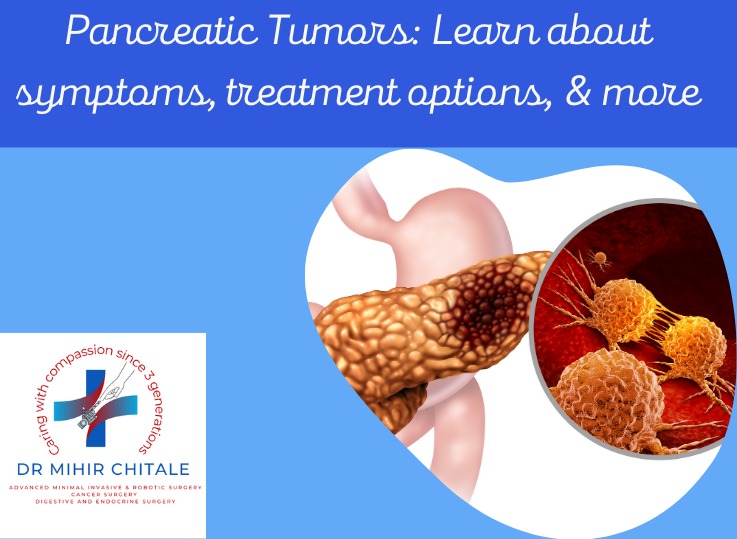
Pancreatic Tumors: Learn about symptoms, treatment options, & more.
Pancreatic tumors, also known as pancreatic cancer, are a serious condition that affects thousands of people every year. This type of cancer is difficult to detect in its early stages and often goes undiagnosed until it has reached an advanced stage. In this blog post, we will discuss what pancreatic tumors are, their causes, symptoms, diagnosis, and treatment options.
Pancreatic tumors are abnormal growths that develop in the pancreas, which is a gland located in the abdomen that produces enzymes that aid in digestion and hormones that regulate blood sugar levels.
There are two main types of pancreatic tumors:
Exocrine Tumor &
Endocrine tumor.
Exocrine Tumors are the most common type of pancreatic tumor and account for about 95% of all pancreatic cancers. These tumors begin in the cells that produce digestive enzymes and can spread to other parts of the body.
Endocrine Tumors, also known as pancreatic neuroendocrine tumors (PNETs), are less common but can still be very dangerous. These tumors begin in the cells that produce hormones, such as insulin, glucagon, and somatostatin.
The exact cause of pancreatic tumors is unknown, but there are several factors that may increase your risk of developing this type of cancer. These factors include:
Age: The risk of pancreatic tumors increases with age, with most cases occurring in people over the age of 60.
Smoking: Smoking is a major risk factor for pancreatic tumors and can increase your risk by up to three times.
Family history: If you have a family history of pancreatic tumors, you may be more likely to develop this type of cancer.
Obesity: People who are overweight or obese may be at a higher risk of developing pancreatic tumors.
Symptoms of Pancreatic Tumors:
In the early stages, pancreatic tumors may not cause any symptoms, which can make them difficult to detect. However, as the tumor grows, it can cause a range of symptoms, including:
- Pain in the abdomen or back
- Jaundice (yellowing of the skin and eyes)
- Nausea and vomiting
- New-onset diabetes
- Loss of appetite and weight loss
- Fatigue
Diagnosis of Pancreatic Tumors:
If you are experiencing any symptoms of pancreatic tumors, your doctor will likely perform a physical exam and order several tests to diagnose your condition. These tests may include:
Blood tests to check for pancreatic enzymes and tumor markers
Imaging tests such as CT scans, MRI, and PET scans
Biopsy to remove a small sample of tissue for examination under a microscope
Treatment of Pancreatic Tumors:
The treatment of pancreatic tumors depends on the stage and location of the cancer. Treatment options may include:
Surgery: Surgery may be an option if the tumor is located in the head of the pancreas and has not spread to other parts of the body.
Chemotherapy: Chemotherapy is a treatment that uses drugs to kill cancer cells and is often used in combination with surgery or radiation therapy.
Radiation Therapy: Radiation therapy uses high-energy radiation to kill cancer cells and may be used in combination with chemotherapy.
pancreatic tumors are a serious condition that requires prompt diagnosis and treatment. If you are experiencing any symptoms of pancreatic tumors, it’s important to speak with a doctor right away. By understanding the risk factors, symptoms, and treatment options of pancreatic tumors, you can take steps to protect your health and improve your chances of a successful outcome.
Dr. Mihir Chitale
(Senior Consultant Surgeon)
Dr. Mihir Chitale is one of the best-experienced surgeons in Advanced Minimal Invasive Surgery, Cancer surgery, Robotic surgery, Digestive Surgery, and Endocrine Surgery.

